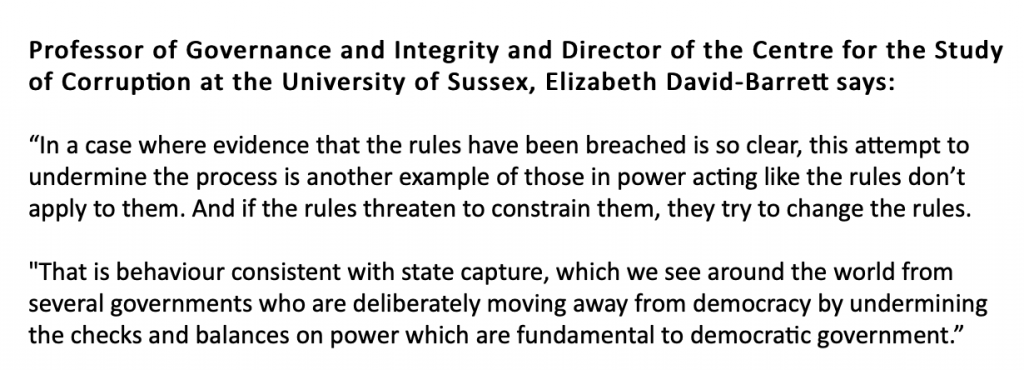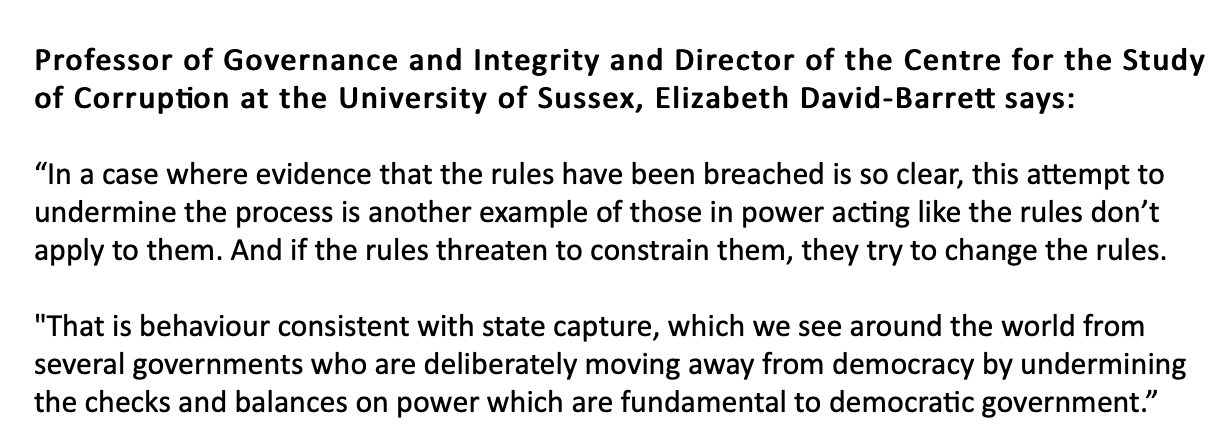Johnson’s Gamble that Backfired
Posted on November 5, 2021
If anyone was still in denial about the level of corruption at the heart of government, they shouldn’t be now.
It was ruled that Owen Paterson had broken the code of conduct when he lobbied ministers at the Department for International Trade and officials at the Food Standards Agency (FSA). This was carried out on behalf of two companies. For this lobbying, he was paid £100,000 a year by the healthcare company Randox and £12,000 by Lynn’s Country Foods. There is no argument. That is what he did; it’s not just hearsay.
Standards
The Commons Standards Committee recommended a 30-day suspension of Paterson, a ruling that is normally accepted without much discussion. Boris Johnson, and presumably, his advisers, decided to whip his party into voting for to rip up the current standards procedure. By doing this, Paterson would be exonerated.
The whip vote, despite a sizeable rebellion, was successful. However, Johnson and his team did not realise what sort of outrage this would cause. Social media overheated with allegations of corruption. This resulted in fury from all sides of the political spectrum. Johnson U-Turned and 256 Tory MPs who voted with the whip, realised their reputations were tarnished forever.
Bizarre Gamble
The big question is why Johnson took such a huge political gamble? It could be the sheer arrogance that comes with an 80-seat majority. It could have been poor advice from advisers in the misguided belief that the public are apathetic to such shenanigans. It could be that he had to back Paterson as his ‘friend’ had something on him if he got thrown under the bus.
One other much mooted opinion is that Paterson is the tip of an iceberg. Johnson was not so much prepared to gamble but was forced to do so in a bid to halt future standards scrutiny. It would explain why he made such a reckless gamble by whipping MPs into something that had the potential to make them look forever grubby.
The link between businesses and the government with regards to untendered contracts, is a strong one. Randox, whom Paterson was paid £100k a year by, won a £347 million contract without a competitive tender process. We have all heard about Serco Test & Trace which was headed up by the wife of the Conservative anti-corruption champion. We are talking billions and billions of taxpayers’ money.
Subversion
Could Johnson be trying to subvert an independent commons inquiry? See below and make your own judgment.

Many are
seeing this as the beginning of the end for Johnson. Those in his party who
were forced to vote or potentially face reduction of constituency funding, must
be privately furious. Those in his party who refused to back the vote, even
more so. It is safe to say Johnson’s position is unstable if not yet untenable.
For me, there is one thing about this grubby affair that stands out like a
beacon coated in illuminous paint, with the word BEACON flashing in fluorescent
lights, whilst ‘THIS IS A BEACON’ emanates out of a loudspeaker.
Why would Johnson undertake such a desperate gamble?


Got something to say?